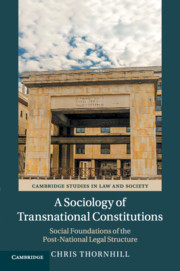Description
A Sociology of Transnational Constitutions
Social Foundations of the Post-National Legal Structure
Cambridge Studies in Law and Society Series
Author: Thornhill Chris
This book develops a unique sociological approach to the analysis of transnational legal norms. This title is also available as Open Access.
Language: English
Subject for A Sociology of Transnational Constitutions:
Approximative price 43.23 €
In Print (Delivery period: 14 days).
Add to cart
A Sociology of Transnational Constitutions
Publication date: 10-2019
Support: Print on demand
Publication date: 10-2019
Support: Print on demand
Approximative price 94.04 €
In Print (Delivery period: 14 days).
Add to cart
A Sociology of Transnational Constitutions
Publication date: 09-2016
Support: Print on demand
Publication date: 09-2016
Support: Print on demand
Description
/li>Contents
/li>Biography
/li>
This volume focuses on the rise of transnational constitutional laws, primarily created by the interaction between national and international courts, and by the domestic transformation of international law. Through detailed analysis of patterns of institutional formation at key historical junctures in a number of national societies, it examines the social processes that have locked national states into an increasingly transnational constitutional order, and it explains how the growth of global constitutional norms has provided a stabilizing framework for the functions of state institutions. The book adopts a distinctive historical-sociological approach to these questions, examining the deep continuities between national constitutional law and contemporary models of global law. The volume makes an important contribution to the sociology of constitutional law, to the sociology of post-national legal processes, and to the sociology of human rights law. This title is also available as Open Access.
Introduction; 1. The national political system and the classical constitutional formula; 2. Constitutional rights and the global political system; 3. The constitution of international law: a sociological approach; 4. The crisis of social inclusion and the paradox of the nation state; 5. Constitutional rights and the inclusion of the nation: systemic transformations I; 6. Constitutional rights and the inclusion of the nation: systemic transformations II; 7. The autonomy of the post-national legal structure: the auto-constituent constitution; Conclusion.
Chris Thornhill is Professor of Law at the University of Manchester. His research is mainly focused on the sociology of constitutional law, both in domestic and transnational contexts, and he has published a number of influential works in this area. His work has been translated into many languages, including Chinese, Japanese, Spanish, German, Russian and Portuguese.
© 2024 LAVOISIER S.A.S.
These books may interest you

Sociological Constitutionalism 109.06 €



